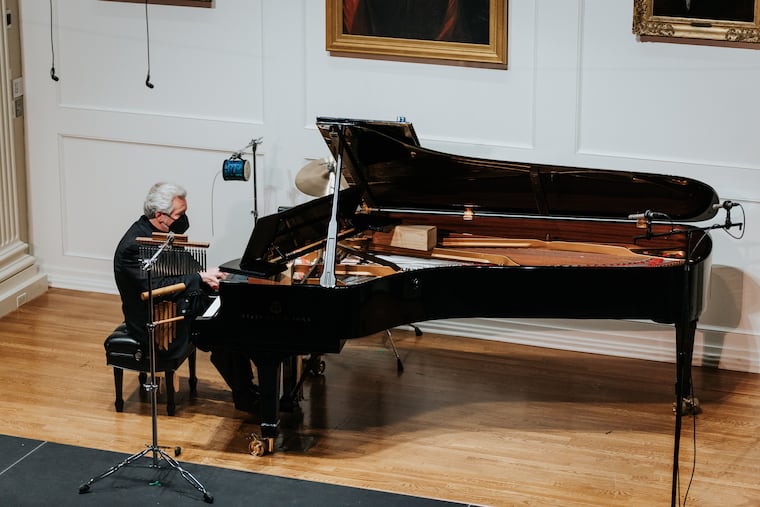New work by Philadelphia’s George Crumb, at 91, is a delight of solo-piano miniatures
Pianist Marcantonio Barone premiered the piece Sunday in a Philadelphia Chamber Music Society livestreamed concert.

New works by Philadelphia composer George Crumb can’t help but be greeted with delight as he continues working in top form at age 91: His Metamorphoses Book II is yet another late-career triumph.
It premiered Sunday in a Philadelphia Chamber Music Society livestreamed concert by pianist Marcantonio Barone.
Like Metamorphoses Book I (composed 2015-17), this new piece is a series of solo-piano miniatures inspired by classic paintings, this time ranging from Vincent van Gogh’s 1889 The Starry Night to Simon Dinnerstein’s 1991 Purple Haze.
Crumb’s approach has always been less uniform than Mussorgsky’s Pictures at an Exhibition, which characterizes realistic paintings with inspired literalism. For Crumb, paintings are jumping off points for his usual wide range of sonic special effects — inside piano strings are plucked, scraped, and tricked out with metal rulers, achieving a level of abstraction that adds to (rather than contradicts) one’s own interpretation of the paintings.
The difference in this new piece, completed amid the 2019 cancer death of his daughter, singer/actor Ann Crumb, is that Crumb joins hands with the kind of 19th-century Romantic Era pianism that he rebelled against with the futuristic sound world that won this emeritus Penn professor both the Pulitzer and Grammy awards.
Now, his musical landscape is broadening to encompass the past. Equal time is given to playing on the actual keyboard. Also, any number of moments in the 10 pieces involve organic thematic development, like Mozart and Beethoven, as opposed to the thriving-on-contrasts manner of Book I (recently released on a Bridge-label recording).
The deftly colored cubes of Paul Klee’s Ancient Sound, Abstract on Black feel both ancient and black, with medieval-chant-like melodies and sinister, bass-range notes.
But how does one translate the inner emotional life of Andrew Wyeth’s famous Christina’s World? Crumb’s distinctive brand of anguished dissonance did the job. The bluish-tinged nude portrait Purple Haze by Dinnerstein (father of the celebrated concert pianist Simone Dinnerstein) has a bluesy chord progression with another ominous bass line.
Crumb seems to delve into the backstory behind Paul Gauguin’s Spirit of the Dead Watching, a portrait of a nude Tahitian girl visited at bedside by a spectral figure. The painter is now viewed as a sexual predator; he gave the 13-year-old model syphilis. The nervous, nagging sounds that came from playing the piano’s inner strings suggested the disease taking hold.
More nervous piano writing followed by sonic explosions usher in Picasso’s Guernica, about the annihilation of a Basque village at the hands of the Nazi war machinery.
The metallic glint of Gustav Klimt’s Portrait of Adele Bloch-Bauer had its sound counterpart in delicate metallic wind chimes — in contrast to the earthier bamboo wind chimes used in another section inspired by Georgia O’Keeffe’s desert landscape in From the Faraway, Nearby.
Marc Chagall’s Easter portrays death as much as it does life. Crumb’s treatment is somehow exuberant without being joyful. While Van Gogh’s Starry Night sky might seem to sizzle for some eyes, Crumb is on the quiet side, with a wonderfully inspired piano melody that suggests a music box from another planet.
Barone had his arms around the piece — both conceptually with his confident execution and literally with the special effects and side instruments demanded in addition to the traditional keyboard.
Bartok’s infrequently heard Suite Op. 14 was a welcome program companion to Crumb with its polytonal, rhythmically idiosyncratic manner, embodying everything we love about the Hungarian composer’s fierce, middle-period manner. Barone played with admirable clarity of sonority and intent.
But I puzzled over what Mozart’s Piano Sonata in D, K. 331 was doing on the program. The first movement got the precious China doll treatment that Glenn Gould employed to prove how much he disliked Mozart.
The concert is available for streaming through Wednesday afternoon, free with donation requested. Information: pcmsconcerts.org/concerts.